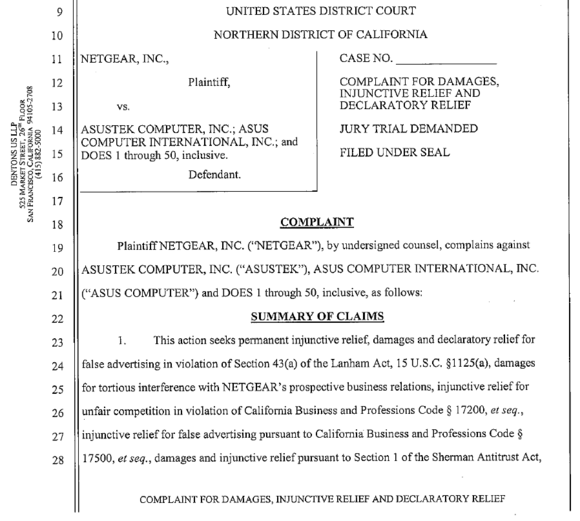Netgear accuses Asus of submitting fraudulent test results to the FCC

A company can go down one of two roads when it creates a new product: It can follow all the rules and regulations and craft the best product its engineers are capable of designing, or it can flout the rules and regulations and cheat its way to market dominance.
Netgear is accusing Asus of taking that low road in the Wi-Fi router market, and the company has filed both a complaint with the FCC and a lawsuit seeking damages and injunctive relief on grounds of unfair competition and false advertising.
In an interview last week, Sandeep Harpalani, Netgear’s director of product marketing, core networking, told me Netgear is accusing Asus of knowingly shipping two products—the RT-N65U 802.11n wireless router and the RT-AC66U 802.11ac wireless router—that do not comply with FCC regulations.

Netgear claims that these and other Asus routers deliver higher wireless output levels than the FCC allows, and that Asus conspired with a third-party testing lab, QuieTek Corp., to submit false test results to the FCC. “We do not believe this could have happened by accident,” said Harpalani.
Netgear claims Asus’s routers fail to comply with a host of FCC regulations.
In my tests late last year, Asus’s RT-AC66U delivered better range than any 802.11ac router I had benchmarked to date (I haven’t tested the RT-N65U, which is also named in Netgear’s complaint). Netgear manufactures a very good 802.11ac router, too: the R6300. But as I said in my review of that product: “Netgear’s R6300 is an exceptionally good router, but it’s not better than the Asus RT-AC66U.”
It’s a sticky situation, as the FCC hasn’t yet dealt with Netgear’s charges. That said, if the agency determines that Asus’s RT-AC66U achieved superiority by defying FCC regulations, I can’t recommend the router to anyone, because it may interfere with other radio communications, including other wireless devices you might be using in your home.

Netgear’s Harpalani said that his company complained to Asus directly about this matter earlier in the year, and that Asus failed to respond satisfactorily. According to Harpalani, Netgear discovered that Asus was cheating when it acquired sample Asus routers from retailers and conducted some of its own tests. “But we cannot do the complete FCC test,” he said, “because the power-output levels have to mimic a client. You have to enable a special mode in the firmware that allows this. It cannot be enabled in the shipping firmware.”
According to Netgear’s lawsuit, Asus’s RT-N65U, RT-AC66U, and other unnamed Asus routers fail to comply with a host of FCC regulations, including specifications for operational mode/description, peak power output, radiated emission band edge test, power density, radiated emission, RF antenna conduction, and occupied bandwidth.
Harpalani said Asus has since released new firmware for these routers that reduces their power output slightly. He added, however, that “it’s difficult to make sure people download and install new firmware. Basically, the lawsuit has been filed, and a request for an FCC investigation has been filed. We’ll wait for the agency to take action. They [Asus] are clearly breaking the law. Now it’s left for the court to decide.”
It will indeed be up to the FCC and the courts to decide whether any laws have been broken. Though wireless routers make use of unlicensed spectrum, the FCC is mandated by Congress to regulate exactly how that spectrum is used, and the FCC’s rules are legally binding. Harpalani said the FCC has not yet responded to Netgear’s complaint.
False advertising, unfair competition, conspiracy…
Netgear’s lawsuit contends that Asus is knowingly engaging in false advertising by claiming that its RT-N65U and RT-AC66U comply with FCC regulations, and that if consumers knew of the models’ noncompliance, a substantial number of router buyers would purchase Netgear’s routers, instead. Netgear’s suit also accuses Asus and QuieTek of engaging in a “conspiracy to unlawfully eliminate Asus’s competitors in the wireless router market, including, but not limited to, Netgear.”
“Our intention is to make sure they [Asus] stop shipping illegal routers, and we’ve requested damages and injunctive relief,” said Harpalani.
Among other things, Netgear is asking a United States District Court to order Asus to stop shipping non-FCC-compliant routers to the U.S. market, recall any noncompliant wireless routers sold in the United States, pay Netgear restitution and damages for lost profits, and pay treble damages for false advertising.
I contacted Asus late last week in hopes of receiving a response from the company to Netgear’s charges. But after receiving several promises that an official statement from the company’s headquarters in Taiwan was forthcoming, I was informed this morning that Asus’s official statement is “No comment while the case is in litigation.”
In this situation, it’s hard to know who to believe. Conspiring to submit false test results to the FCC would be an incredibly risky move for both Asus and QuieTek. Then again, cheating is one of the easiest ways to beat the competition. On the other hand, Asus has been shipping its RT-AC66U and the RT-N65U routers for more than a year now. If those models have been out of compliance with FCC regulations from the beginning, why is Netgear only now crying foul?
I won’t venture to guess where the truth lies, but I will predict that if the FCC finds Netgear’s complaint to be valid, Asus is in for a world of hurt. Conversely, if the FCC dismisses the complaint, Netgear’s lawsuit will go up in smoke—and Asus will very likely hit back with a colossal lawsuit of it own.
R6300 802.11ac Router
Price When Reviewed:$219.99Read our full R6300 802.11ac Router review
RT-AC66U 802.11ac Router
Price When Reviewed:$199.99Read our full RT-AC66U 802.11ac Router review






